The Falcon and Winter Soldier went out with a bang. Join Rachel Stewart, Will Johnson, JP Nunez, and Don Shanahan as they team up once again to discuss how the Disney+ six-part series wrapped up, and how the finale will impact the MCU’s Phase 4.
Rachel Stewart: A lot has happened since we last talked, and it feels like all the major characters have gone through significant inner transformations. Last time, we all hated John Walker, a feeling which deepened when he defiled the shield in Episode 4. But I found the finale softened my view of him a bit as he shifted to the role of U.S. Agent. Anyone else feel the same?
Will Johnson: No. Him kinda sorta holding a truck up for a minute and quoting Lincoln doesn’t absolve him of murdering a dude with the shield.
Don Shanahan: I’m with Will on this one. Too little, too late.
JP Nunez: Definitely. He’s trying to be a good guy, but he’s just flawed. He killed a guy because his best friend was murdered right before his eyes, and I don’t think any of us can sit here and say that we wouldn’t react with rage if we were in a similar situation.
Don: Yeah, I agree again. The right guy for that position wouldn’t do that. Such a flaw is too big.
JP: I didn’t say it’s OK. I’m saying that it doesn’t make him an evil person. I’m saying that we don’t know how we’d react in that situation, especially given the trauma he probably has from his time in the military. In short, he needs therapy rather than just straight condemnation.
Will: True and it does bring up an interesting topic: why do we hate John Walker for one murder when Loki, who is beloved, has killed thousands.
JP: Although, to be clear, he does deserve condemnation for murder as well.
Don: And I feel like one job-stripping Senate hearing isn’t enough for that mistake.
Rachel: His choices make him unfit to be Captain America, but every word he said in court was true—the country made him and then threw him away when he no longer served their purposes. At least now he can be a mercenary?
Don: I agree. Every word he said was true. Which is why I can’t call him all-the-way “evil.”
He’s broken and misguided and a foil for the two title characters who either are known for giving therapy or knee-deep in completing it.
JP: Great point, Don.
Rachel: Exactly. If anything, they all had more in common with one another—it’s the journeys they choose that defined them.
Will: It does show how “grey” the show is by proving Zemo correct about human corruption and super-soldier serums and we can all agree Zemo is a far more “evil” person than Walker.
Don: The writers are easily showing how the men that can wrap their heads around trauma are the better overall people, with or without full-evil acts and intentions.
Rachel: Yes, we love Zemo—especially when he dances.
Don: Most definitely, Will.
Will: That’s my point Rachel: we adore Zemo and Loki and give them thousands of chances at redemption. And in general we (or most likely me) refuse to give Walker that chance. I find it an interesting struggle.
Rachel: I’m more apt to give Walker a chance now that he’s U.S. Agent, because he doesn’t have to live up to the ideals of Captain America. He can come into his own, and I see him playing both sides.
Don: Me too, Rachel.
Will: Very true! I think we all felt a bit… betrayed, perhaps… by someone else that we see as not worthy, using the shield which is so much more than just a weapon. It’s like Thanos using Mjolnir.
JP: I think you’re right about the shield, Will. Zemo and Loki never used a beloved weapon (or took on the mantle of a beloved hero), so we don’t have that same gut reaction to them as we had to John Walker. We can let them be villains and love them as characters in a way that we can’t with Walker because he’s infringing on the territory of a character we already love.
Will: Boom, awesome point.
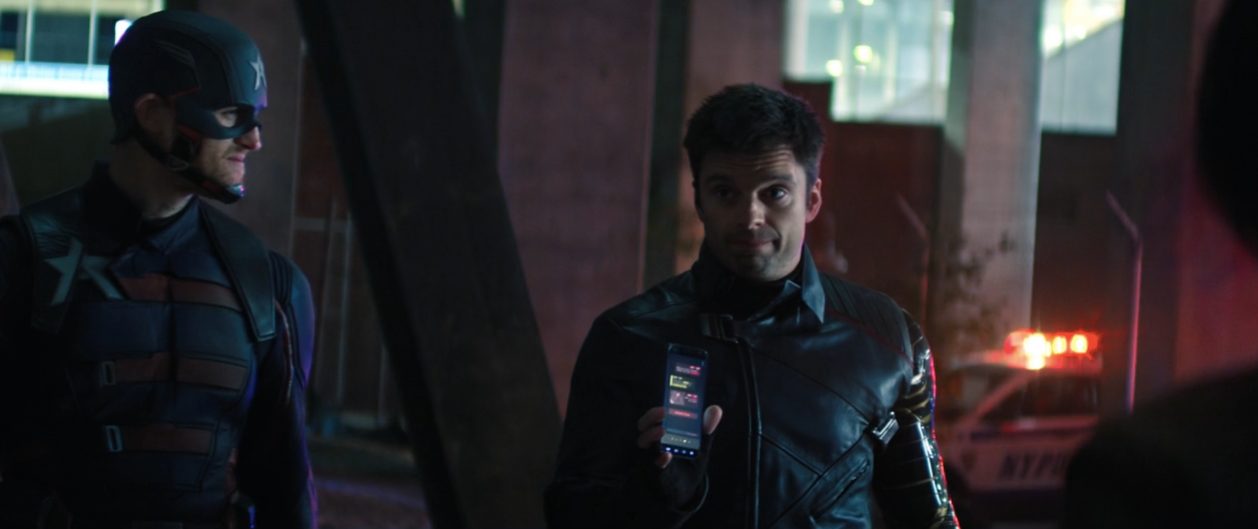
Rachel: And that’s why Bucky reacted so harshly, which leads me to my next point.
Bucky’s emotional journey from Hydra-brainwashed Winter Soldier back to faithful sidekick and friend has really been the heart of the series for me. Considering his character’s transformation was a large part of the tension and angst in Captain America: Winter Soldier and Captain America: Civil War, it felt nice to see him not only come through it all a survivor, but he was able to process and heal, forgive himself, and rebuild a sense of purpose by Sam’s side.
Don: Very much so, Rachel. If it’s not the whole heart, it’s two of the four chambers shared by Sam’s maturation to take the full mantle.
Rachel: That is a beautiful metaphor, Don.
JP: Definitely. I think that finding a friend and a place to belong now that Steve is gone was especially important for him.
Will: That’s why the end credits saying Captain America and the Winter Soldier was so applause-worthy. The show earned that title by the end.
Don: EARN is the #1 propulsive verb of this show. What is achieved the right way and what is not, from top to bottom.
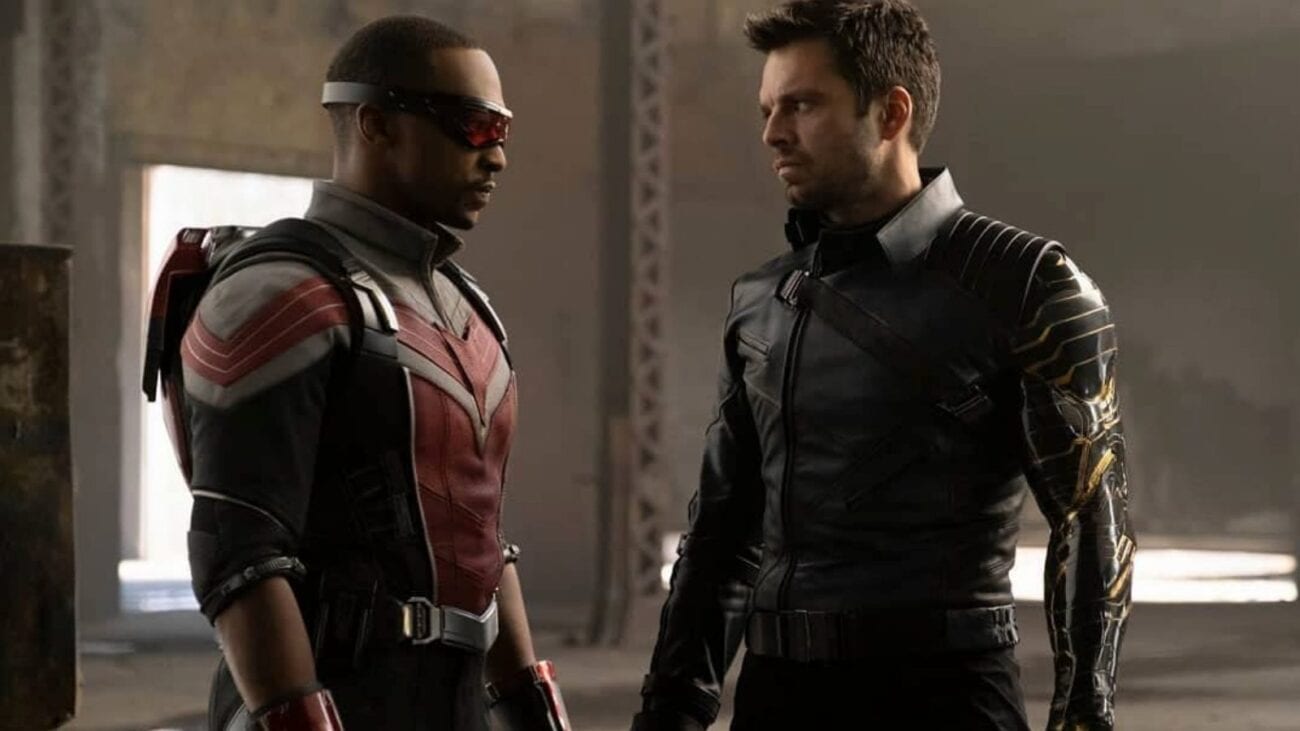
Rachel: Sam and Bucky’s relationship has changed over the course of the series’ six episodes. In what ways does it mirror their own personal relationships with Steve Rogers?
Will: Steve could always see the good in people even in the midst of their flaws. Sam does the same thing: he sees the good in Karli and he has always seen the good in Bucky.
JP: I think they’ve found in each other what they both had with Steve.
Don: I think a big part of their relationship growth is recognizing their “good man” qualities that echo what Erskine thought of Steve and what Steve then thought of Sam.
Rachel: Exactly. The scene where they trade the shield back and forth (in Episode 5) is one of my favorites. Because Bucky explains his feelings and offers a real, heartfelt apology, and Sam quietly accepts it and then gives him some tough love.
Don: So true. And there it is again. Men willing to give and receive forgiveness, grace, tough love, and criticism when it is…EARNED.
Rachel: And these are big, tough men doing it. Sorry, but BE STILL MY HEART.
JP: Excellent observation, Rachel. Men in our culture today are often not comfortable getting that vulnerable and that honest with anyone, let alone one another, and this series showing Bucky and Sam doing that is a great example of how a man can let himself be vulnerable without sacrificing any of his masculinity.
Will: I don’t know if I can form a coherent thought on this one but the series does a good job of showing men in vulnerable positions (something atypical of “male” driven action stuff) and women in more positions of power (the evil Hydra Senator, the psychiatrist, Sharon as the Power Broker, and Karli.) There’s Ayo and Countessa Valentina Allegra De Fontaine, too. There were a lot of strong female types dictating the currents here.
Rachel: That’s an excellent point, Will—I hadn’t even thought of how the traditional gender roles were swapped. And Sharon’s turn as the Power Broker was the evil glow-up we all deserved.
Don: Very much so, Will and Rachel.
Rachel: JP, there’s a meme floating around that’s kind of stuck with me—when Steve Rogers lost Bucky, he cried; when John Walker lost Lemar Hoskins, he killed someone.
Don: Therein lies the difference between the true heroes and the pretenders.
Will: I think that has been a theme Marvel has slowly developed over the last few years: what does it take to be a hero. Thor struggled with failure, Hawkeye became Ronin and a vigilante, Bucky dealt with nightmares and a desperate need to amend, Sam tried and initially failed to accept himself as the successor to the shield, Walker trying and failing to be a symbol, and so on.
JP: Yeah that’s true. This show has compared and contrasted its characters with Steve in a lot of subtle ways, and that’s one of them.
Don: And to do all of that without bringing in Chris Evans was shrewd and effective.
JP: I think you’re totally right, Don. The heroes can rise above their flaws and do the right thing no matter what they feel. It’s a great example for us to strive for.
Don: No flashbacks needed. No coda-unraveling old Cap cameos. His name and aura were enough, as it should be.
JP: I loved that they didn’t bring Steve in. One of the things that’s really impressed me about both MCU Disney+ shows so far is that they haven’t felt the need to bring in cheap cameos like that. They’ve told their stories about the characters involved, and they’ve made them work.
Rachel: I think TV has given them more time to develop these emotional backstories, although this episode did have a lot of big battles right from the start. There were plenty of quiet moments, too.
JP: I think they earned an almost non-stop action episode after all the quiet character moments in the previous five.
Will: Like most Marvel films, I don’t tend to remember the battle scenes with glee. I tend to latch onto the character moments and despite being an “action” series, nothing is more emotionally compelling than Isaiah Bradley revealing his horrors, Sam and Bucky’s personal moments, or the many scenes of racial tension that still exist even in a world of superheroes.
Don: I heard a complaint lodged today that both this show and WandaVision couldn’t help but end with lengthy action scenes in their finale. I was like “that’s kind of the point” and wondered if they missed the second-half 25-minute-long coda finishes after the action both series had.
Rachel: The scene where Bucky cried and smiled when he realized he was finally free (in Episode 4) killed me. Years in the making, and they hit with you at the opening on an episode? Damn, Marvel, slow your roll.
Will: I cried multiple times during this series. I can’t say many shows (or movies) make me do that repeatedly.
Don: Right on, Will. Right there with you.
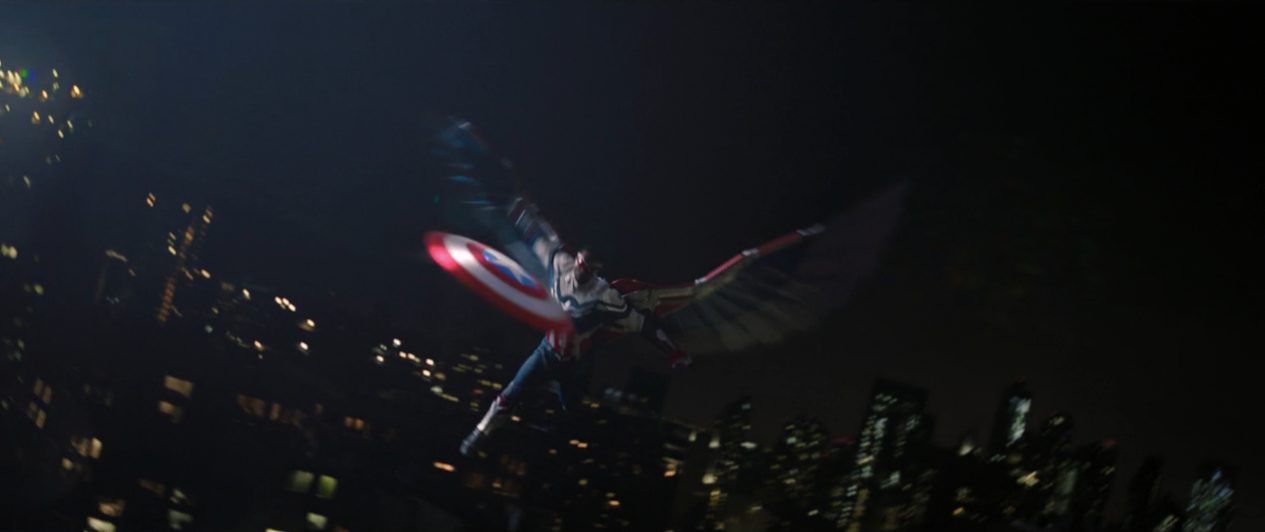
Rachel: Last but not least, there’s Sam Wilson’s journey. In the first episode, he gave up the shield. In this episode, he upheld the mantle of Captain America in words, deeds, and actions. I went back and watched the Avengers: Endgame scene where the elderly Steve Rogers gives him the shield and Sam says, “It feels like someone else’s.” From the moment he busted through that window at the beginning of the finale episode, I definitely found myself echoing Steve Rogers: “It isn’t.” How did everyone feel about Sam’s thoughtful journey to filling Steve Rogers’ shoes?
JP: Even though I didn’t want Sam to become Captain America, I thought they executed it really well. My biggest reason for being against it is that Sam doesn’t have superpowers, but now that he basically has a vibranium Iron Man suit, it definitely makes the idea much more palatable. The suit more or less gives him superpowers (like we saw when he saved the truck), so it works.
Don: I couldn’t be happier with the slow-played, six-episode arc to get to this point. If this was a movie, all these swirling doubts, regrets, and resurgences would be crammed into the first hour of a movie, cliched training montage and all. But here, expanded into a series and mixed with other threats and plots, it played perfectly.
Rachel: Exactly, Don. Spot on.
Don: This was proper character groundwork where Season 2 can be the #NotMyCaptainAmerica journey after what this first season (again) earned and established.
Will: I was awake at 4:00 am and I woke my kids up because I was literally dancing and screaming when I saw Sam as Cap. I cried like a baby. It was so important to me that he embraced being Cap (plus it didn’t hurt the suit was COMIC ACCURATE). Which amazes me that intellectual property can be so impactful to me. A few people mocked a Twitter user for saying that comic book characters are modern-day mythological figures but, frankly, they ARE. Just look at the OWNERSHIP we took over Captain America the symbol?
Rachel: “I believe we can do better.” MIC DROP OF THE CENTURY, and could have easily come from Steve Rogers’ lips.
JP: I also think Sam filled Steve’s shoes about as well as anyone other than Steve himself could. While I had some issues with his monologue after saving the day, I think his recognition that we can’t just condemn the Flag Smashers without understanding the cause they were fighting for was exactly what Steve would’ve wanted him to do.
Will: Yes, Sam’s speech was phenomenal because it proved that what Karli was saying was right if handled the correct way. Once again, Captain America finding truth and good out of the flaws.
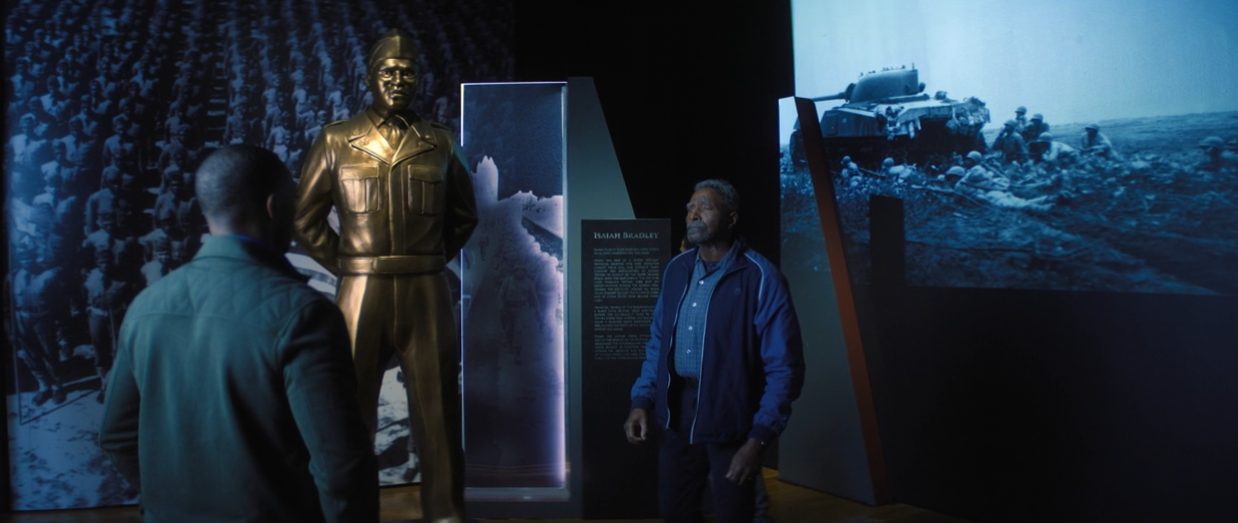
Rachel: Sam also found a way to tell Isaiah Bradley’s story without endangering him. The Smithsonian memorial scene had me crying buckets. He made it right without hurting him more and honored all he went through.
Don: Yes! Let’s just give Carl Lumbly the Guest Actor Emmy award already, too. That man’s ability to line-read indignation and pain is up there with anyone with bigger names. He’s made a hell of a career of conveying that emotion.
Rachel: Every scene between him and Anthony Mackie was master class level. The tension, the hurt, the wanting to understand.
Will: Brilliant writing, too. The fact that Isaiah Bradley did the EXACT SAME THING as Steve (i.e. breaking out his buddies out of a POW camp) but was sentenced to prison and tortured for 30 years for it is amazingly telling and, for Americans, a truth we may not want to acknowledge as accurate.
Rachel: Marvel and Disney+ didn’t sway away from hard-hitting issues—racism, trauma, PTSD related to military service—in fact, it leaned into those issues quite heavily throughout the entire series. Why is it important for a brand of this caliber to tackle these issues thoughtfully and through this medium?
JP: It’s important because we all need to do what we can to make the world a better place, and since the people at Marvel have a much bigger platform than most, they need to use that platform in some way. And addressing those kinds of issues in their shows is one way to do that.
Will: Personally, I think Marvel NOW understands just like Marvel comics did that they have a responsibility. When something is so ingrained in the culture, it must take on great responsibility in speaking a message. The new Marvel of the 1960s understood that its audience was growing up in a time of great change and that kids and teenagers have their own struggles. Marvel now appeals to an even WIDER audience (kids and adults) and some of the symbols and iconography are so prevalent in the society that not addressing issues right at the core audience would be sort of irresponsible.
Don: I think it’s important because an entity this big owning the character universe they do needs to honor the impact that they have and can represent. Comics are ageless, yet they have always incorporated their present times into their fantasy timelines as a way of building their characters and imbuing their reading audience with solid, impressionable values. So often, it’s kids and teens reading and following these characters. They need these examples and influences that help translate or filter the world around them.
JP: I also think that storytelling is one of the best ways to convey important ideas because people are much more willing to accept something if it’s in a story than if it’s just stated matter-of-factly. Even people who don’t agree with what they’re saying will accept it more if it’s in a story they enjoy with characters they love, and that could begin a real process of change in people’s minds and hearts if they’ve been closed off to important issues.
Rachel: Well said all around, and I agree. And while there may be futuristic or fantasy elements involved in the MCU, they always come back to the human angle—Dr. Strange losing the ability to be a surgeon, Wanda’s grief over losing Vision, the Hulk’s inner war with himself, and Thor’s failure to defeat Thanos—and that’s what keeps me coming back as a viewer. Because I can understand these characters’ struggles and that is very empowering.
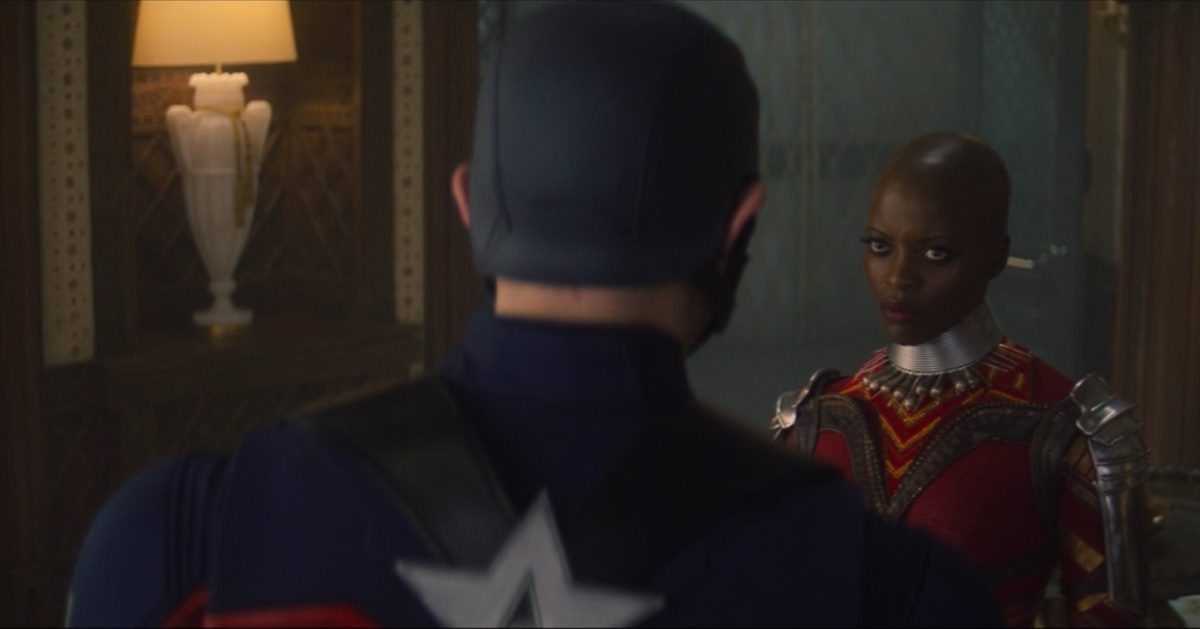
Rachel: Wakanda’s Dora Milaje also played a role in this series. Do we think anything that played out here will come up in the next Black Panther film? Also, Bucky was called the “White Wolf” more than once in this series—are they setting him up to take on a new mantle now that he’s dealt with his trauma?
JP: I wouldn’t be surprised if Zemo is in Black Panther 2. They’re obviously saving him for a future story, and since Wakanda seems to have more beef with him than anyone else, Black Panther 2 seems like a natural place for him to appear next. I definitely think they’re setting up Bucky to take on the name of White Wolf. Since Sam got a new superhero moniker, it’s only natural that Bucky would, too.
Don: I wouldn’t see why not, Rachel. Black Panther 2 is inching closer and having a Wakandan line anchored here with Captain America and Bucky can keep the connectivity going. We’ve got Zemo sitting in The Raft and the Dora Milaje ready to police more threats.
Will: A lot of “theories” out there speculate the Thunderbolts are coming and Zemo led the Thunderbolts in the original lineup in the comics so, take that for what it is worth.
Rachel: I’m really excited to see what’s next for Bucky and if that means more time in Wakanda, I’m here for it. He’s the reason Sam got his new gear, too.
And while we’re speculating…this finale also set up many plot points for a new Captain America film (which was just announced after the finale aired) or even a second series. With Sharon as the Power Broker, John Walker as U.S. Agent, and Zemo still being able to manipulate things while inside the Raft, what do we think is next?
Will: Marvel doesn’t do anything by accident. Black Panther was one of the biggest endeavors Marvel Studio put out and made sure, in one of their most-watched films, to put Bucky in the end credits. He is forever tied to Wakanda and I can’t see Wakanda NOT playing a part in his future. What direction it will go through is refreshingly unclear. I like that.
Don: Gosh, I don’t know! The sky’s the limit. I name-dropped this earlier with the hashtag, but I’d love to see a “Not My Captain America” adaptation. They teased the racial struggles, not let’s really face it and fight it.
Will: And in a “Not My Captain America” adaptation there would have to be Cap Wolf and I somewhat jokingly want a Cap Wolf in the MCU. (If you don’t know what it is, kids, look it up.)
JP: As Don said, the sky’s the limit. I don’t know the comics well enough to say where I think all these characters are heading, but I definitely think that at least some of them are going to meet up again sooner rather than later.
Will: Marvel is clearly setting up the Young Avengers so Sam guiding them would be a good step.
Don: That’s definitely coming, too.
Will: We met (soon-to-be) Patriot in The Falcon and the Winter Soldier, Wanda’s twins in WandaVision, and we’ve already been introduced to Cassie in the Ant-Man films. The Hawkeye series is on the horizon, too, featuring Kate Bishop.
Don: You’ve got Kate Bishop coming in Hawkeye and Torres here in The Falcon and the Winter Soldier. I wouldn’t be surprised if She-Hulk is roped into that.
Rachel: The She-Hulk series is just around the corner. A lot of people speculated she could have turned up here.
Will: And Tim Roth is signed on to appear in She-Hulk and The Abomination is in the Thunderbolts so…oh my god, my brain just overloaded!
Rachel: Whatever’s next, I’m with the MCU til the end of the line. Next stop, Time Variance Authority with Loki!
Don: Oh my!
JP: I can’t wait for Loki. That show looks like just the kind of sci-fi/fantasy insanity that I live for.
Don: Shit’s about to get weird!
Will: More Multiverse craziness!


